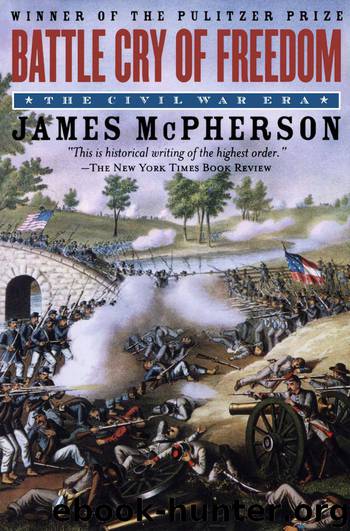Battle Cry of Freedom by James M. McPherson

Author:James M. McPherson [McPherson, James M.]
Language: eng
Format: epub, mobi
Publisher: Oxford University Press
Published: 1988-06-06T04:00:00+00:00
15
Billy Yank's Chickahominy Blues
I
In May 1862, prospects for the Confederacy's survival seemed bleak. Most of the Mississippi Valley had fallen to the enemy. In Virginia, McClellan's army of 100,000 had advanced to within hearing of Richmond's church bells. Irvin McDowell's corps, which Lincoln had held near Fredericksburg to cover Washington, prepared to march south to join McClellan's right wing. This would give the Union forces closing in on Richmond some 135,000 men, about twice the total that Joseph E. Johnston could bring against them. Although McClellan's past performance suggested that he would lay siege to Richmond rather than attack Johnston's army, the fall of the Confederate capital seemed only a matter of time.
The next act in this drama took place not in front of Richmond but a hundred miles to the northwest in the Shenandoah Valley. Commanding the rebel forces in that strategic region, Stonewall Jackson had been reinforced to a strength of 17,000 men by a division from Johnston's army. Its commander was Richard S. Ewell, an eccentric, balding, forty-five-year old bachelor whose beaked nose and habit of cocking his head to one side reminded observers of a bird. Everything about Ewell seemed odd, from his ulcer-induced diet of hulled wheat boiled in milk with raisins and egg yolk to his manner of cursing with a lisp. But while Ewell was an unfailing source of jokes around soldier camp-fires, Jackson seemed even more peculiar. Attired in an old army coat he had worn in the Mexican War and a broken-visored V.M.I, cadet cap, Jackson constantly sucked lemons to palliate his dyspepsia and refused to season his food with pepper because (he said) it made his left leg ache. A disciplinary martinet, Jackson had tarnished some of the fame won at Manassas by an aborted winter campaign into West Virginia that provoked a near mutiny by some of his troops. A devout Presbyterian, Jackson came across to some colleagues as a religious fanatic. Taciturn, humorless, and secretive, he rarely explained to subordinates the purpose of his orders. His rule of strategy—"always mystify, mislead, and surprise the enemy"—seemed to apply to his own officers as well.1 Before May 8, 1862, many of his soldiers considered him crazy and called him "Old Tom Fool." Events during the next month, however, showed them that he was crazy like a fox. These events made Jackson the South's premier hero for a time—until eclipsed by an even wilier fox with no tinge of fanaticism, Robert E. Lee.
It was Lee who unleashed Jackson in the Shenandoah Valley. Serving as Jefferson Davis's military adviser, Lee conceived the idea of a diversion in the Valley to prevent McDowell's Union corps from reinforcing McClellan. Once before, after the battle of Kernstown in March, the northern command had cancelled the transfer of troops from the Valley to eastern Virginia. Since then, one of Nathaniel Banks's three divisions west of the Blue Ridge had departed eastward. A second was preparing to follow. Lee hoped that an offensive by Jackson would compel them to return.
Download
This site does not store any files on its server. We only index and link to content provided by other sites. Please contact the content providers to delete copyright contents if any and email us, we'll remove relevant links or contents immediately.
| Africa | Americas |
| Arctic & Antarctica | Asia |
| Australia & Oceania | Europe |
| Middle East | Russia |
| United States | World |
| Ancient Civilizations | Military |
| Historical Study & Educational Resources |
1861 by Adam Goodheart(898)
Abraham Lincoln: A Life, Volume 2 by Michael Burlingame(797)
Smithsonian Civil War by Smithsonian Institution(789)
Ulysses S. Grant by Michael Korda(758)
Battle Cry of Freedom by James M. McPherson(754)
The Fiery Trial by Eric Foner(750)
Rebel Yell: The Violence, Passion, and Redemption of Stonewall Jackson by S. C. Gwynne(747)
This Republic of Suffering: Death and the American Civil War by Drew Gilpin Faust(717)
Abraham Lincoln in the Kitchen by Rae Katherine Eighmey(714)
Rock of Chickamauga(709)
Bloody Engagements by John R. Kelso(704)
The escape and suicide of John Wilkes Booth : or, The first true account of Lincoln's assassination, containing a complete confession by Booth(679)
Lincoln's Lieutenants by Stephen W. Sears(678)
Leaves of Grass by Walt Whitman(659)
Union by Colin Woodard(652)
1861: The Civil War Awakening by Adam Goodheart(632)
Rise to Greatness by David Von Drehle(591)
The Fiery Trial: Abraham Lincoln and American Slavery by Eric Foner(589)
Leaves of Grass (Barnes & Noble Classics Series) by Walt Whitman(585)
